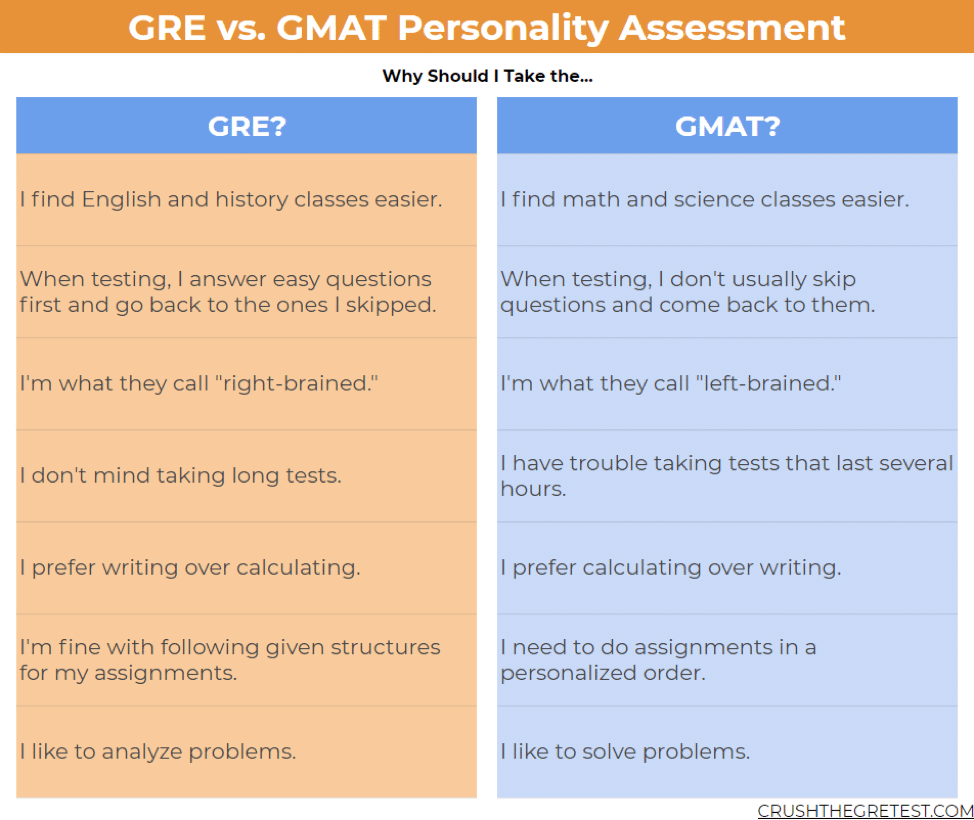
Most graduate schools require students to take some sort of entrance exam to be admitted into their program. The GRE and GMAT are some of the most popular of these entrance exams, and are considered good predictors of how students will perform in graduate school. Hundreds of admissions committees around the country weigh these scores heavily when making their yearly admissions decisions.
The GRE is administered by the ETS, which stands for the Educational Testing Service, and is an exam that graduate programs of all kinds use to measure applicants’ potential. According to the ETS’s 2019 GRE report, 532,826 people took the GRE in the 2018-2019 testing year. The GMAT, on the other hand, is specifically designed for graduate business programs. Though it’s a widely-used test, the GMAT isn’t taken as often as the GRE because of its specialization. The GMAC (the Graduate Management Admissions Council) reports that 224,621 people took the GMAT in the 2018-2019 testing year.
These numbers just go to show how popular these tests are—admissions officers make hundreds of thousands of decisions based on these tests every year. So, to help you make your graduate application as polished and competitive as it can be, we’re providing you with the ultimate guide to the GMAT vs. the GRE. This includes details about their structure, format, scoring, studying requirements, and more, in order to help you decide which test you should take. Once you’ve made your decision, you should check out our more in-depth pages on GRE scores and GMAT scores, which give you a complete rundown of each exam and show you how to set and reach a great target score.
Should I Take the GMAT or GRE?
Before you figure out which test you want to take, your first step should be seeing whether you have to take either exam specifically. Start off by contacting the admissions department of the graduate schools you’re applying to—they’ll provide the latest information about their admissions process. If you’re not applying to business school, of course, your answer is simple: take the GRE! Non business-related grad programs don’t usually require the GMAT, and even some business-related programs like those for economics don’t require the GMAT either. If you are considering GMAT vs GRE for an MBA, on the other hand, the answer is more complicated, as you probably have a choice between the two tests.
According to a 2016 survey by Kaplan test prep, who offers sought-after Kaplan GRE and Kaplan GMAT prep services, around 92% of business schools accept the GRE for graduate applicants, marking a drastic rise in GRE acceptance over the past decade; this includes top business schools, as 18 of the top 50 b-schools were included in Kaplan’s 2016 survey.
Although this survey is the most updated information available on the subject, we’re sure the number of GRE-friendly b-schools has only grown over the past several years.
In addition to asking whether or not they accept the GRE and/or the GMAT, you should ask the admissions office if they prefer one exam over the other, and which scores they consider to be equivalent when comparing the two tests. In that same 2016 report, Kaplan found that 73% of business schools view both exams equally, but that still leaves a fair number of b-schools that prefer to see GMAT scores in their applications. So, if you’re going to a business school that accepts the GRE, you have to choose: which test will suit you best?
First, we’ll show you the logical arguments that might make one test a better option than the other. Then, we’ll take you through the personality factors that might give you a better or worse score on each test, before we’ll give you a detailed run-down on all the major differences between the exams.
Why take the GRE?
If you haven’t decided whether to go to business school or a different type of graduate program (or if you want to keep your options open until you find out where you’ve been accepted), it’s probably better to take the GRE, as long as it’s accepted by the business schools you’re applying to. As a more widely-taken test, there are also more course options for GRE prep than there are for GMAT prep. In general, the GRE is a more language-heavy test when compared to the GMAT, and has slightly less complex math problems.
Why take the GMAT?
Signing up for the GMAT indicates that you’re serious about attending business school, and many of today’s business programs will view that favorably. This is because only business schools (and all business schools) accept the GMAT, whereas students who take the GRE can also apply to graduate programs in other fields—they’ll view your choice to take the GMAT as a sign of focus and dedication, a sign that you know you belong in their program. If you’re more numbers-savvy, the GMAT will probably be the better choice for you as well—its Quantitative and Integrated Reasoning sections are slightly more difficult than the GRE’s math content. Lastly, though there are fewer GMAT prep course options than there are for the GRE, the GMAT courses we’ve reviewed are still high-quality products that can help you get a good score, so keep those possibilities in mind when you’re thinking of how you’ll study for the test.
Personality factors don’t have a whole lot of influence on who does well or poorly on each test, as both the GRE and GMAT assess verbal and quantitative skills. However, if you’re struggling to decide, think about how these statements apply to you; they may give you a new perspective on your decision.

How Is the GRE Different From the GMAT?
Although both tests share plenty of similarities, there are important differences in their format, content, and scoring that you should keep in mind. For example: they have different computer-adaptive systems that influence your test-taking process, one has longer sections with more questions, and so on and so forth. Though these details may not seem important at first, getting to know how the exams are structured and scored might be what makes one test a vastly better option for you.
GRE vs GMAT Format
GRE Sections
The GRE revised General Test (the standard version of the exam) is designed to measure your verbal, quantitative, critical thinking and analytical writing skills to determine your suitability for graduate study.
There are three main parts to the GRE: a Verbal Reasoning section, a Quantitative Reasoning section, and an Analytical Writing section, plus a possible fourth section that is unscored and includes questions used purely for ETS’s research purposes. The Analytical Writing section will always come first, but the other sections will be given to you in a random order.
Analytical Writing Section:
You are given two separately-timed essay tasks: an ‘Analyze an Issue’ prompt and an ‘Analyze an Argument’ prompt.
- Analyze an Issue: this task evaluates your ability to think critically about claims and statements that relate to a specific topic, and requires that you write a clear response according to specific instructions. You are typically asked to agree or disagree with the claim you receive and explain why.
- Analyze an Argument: this essay task measures your ability to understand, analyze and evaluate an argument or line of reasoning and express your evaluation in writing. You must analyze and discuss the logical soundness of the argument that you’re given and determine if there’s enough evidence in the text to support that argument.
Verbal Section:
This section tests your verbal aptitude in several ways. You must interpret and evaluate written material and understand the information contained within it, analyze relationships among the various parts of sentences, and identify relationships between words and concepts. There are three types of questions in this section:
- Reading Comprehension: these questions require you to read a passage and answer content-related questions that follow, or to click on a sentence in the passage that meets a certain description.
- Text Completion: with these questions, you fill in the blanks for given sentences based on various options provided for each blank.
Sentence Equivalence: you’ll be asked to select two answers that would complete a given sentence without contradicting its original meaning; both the answers you choose should work as solutions, and no credit is given to partially correct answers.
Quantitative Section:
This section measures your ability to understand, interpret and analyze quantitative information, solve problems by using mathematical models, and apply basic mathematical concepts and skills based on arithmetic, algebra, and geometry (note that the quantitative section of the GRE includes an on-screen calculator for test-takers). You’ll see three types of questions in this section.
- Quantitative Comparison: these questions ask you to compare two quantities and determine the relationship between them.
- Problem Solving: these questions require you to use basic math skills and concepts.
- Data Interpretation: these are problems that you’ll solve based on information provided through sets of charts or graphs.
Unscored or Research Section:
Your test may include one additional section of either Verbal or Quantitative questions.
- A Research Section may be included at the end of the test. It is unscored and clearly marked. Questions in this section contribute to ETS research.
- An Unscored Section may be included at any point after the Analytical Writing Section and will contain 20 quantitative or verbal questions that are being tested for future use. While it is unscored, you won’t know which section it is, so it’s best to treat all sections as though they will be scored.
GMAT Sections
The GMAT aims to measure various analytical and problem solving skills along with other abilities that are considered critical in business and management.
There are four parts to the GMAT: the Analytical Writing Assessment (AWA) essay, an Integrated Reasoning (IR) section, a Quantitative Reasoning (QR) section, and a Verbal Reasoning (VR) section. You’ll be given three options for the order in which you wish to take the four sections.
Analytical Writing Assessment Section:
This section requires an analysis and critique of the reasoning behind a specific argument that is provided as your prompt. It measures your critical thinking skills and ability to communicate complex ideas in writing.
Integrated Reasoning Section:
This section measures your ability to integrate data to solve complex problems. All parts of each question, which come in four different types, must be answered correctly in order to gain a correct score.
- Graphics Interpretation: these questions present data through a visual (graph, table, etc.) and ask you to choose correct statements about the information in the image.
- Two-Part Analysis: these questions require you to select two answers, each in a separate column of options, that will result in a two-part solution.
- Table Analysis: these are problems that involve interpreting data from a table to determine which of the given statements are true or false.
- Multi-Source Reasoning: with these problems, you’ll sort through multiple sources to find the data needed to answer a provided question.
Quantitative Section:
This section tests your content knowledge of essential math skills and measures how well you analyze data and use reasoning to draw conclusions.
- Data Sufficiency: these problems typically consist of a question and two statements of data, and you must decide if those statements provide enough information to answer the question.
- Problem Solving: these are math problems that test your fundamental knowledge of arithmetic, algebra, and geometry.
Verbal Section:
This section measures your ability to comprehend, evaluate, and correct the written word, using three types of questions.
- Reading Comprehension: these questions evaluate how well you understand, analyze, and apply information and concepts based on a text.
- Critical Reasoning: with these questions, you’ll use reasoning skills to formulate and evaluate arguments and plans of action.
- Sentence Correction: these questions require you to determine which version of 5 possible sentences is the most grammatically correct.
GRE vs GMAT Computer-Adaptive System
GRE: Computer-Adaptive Sections
The GRE revised General Test is adaptive at the section level (as opposed to adapting to each individual question you answer). You’ll complete each of the three main sections in two parts, and that’s where the computer-adaptive system of the GRE kicks in; the difficulty of the second Verbal Reasoning or Quantitative Reasoning section on your GRE will depend on how well you performed on the first section of that type. With the GRE, you can skip or go back to questions and change answers within a single section.
GMAT: Computer-Adaptive Questions
In contrast to the GRE, the level of difficulty for each individual question you receive on the GMAT is based on whether or not you answered the previous question correctly. On the GMAT, you can’t skip a question or go back to change your answer later on.
GRE vs GMAT Length
GRE Length
On the day of the exam, you’ll have slightly less than 4 hours (plus a 10 minute break after the third section) to complete the GRE. Its sections are timed as follows:
- Analytical Writing: 60 minutes to complete one section consisting of two essay questions, 30 minutes for each question
- Verbal Reasoning: 60 minutes to complete two sections of approximately 20 questions each, 30 minutes for each section
- Quantitative Reasoning: 70 minutes to complete two sections of approximately 20 questions each, 35 minutes for each section
- Unscored or Research Section: either 30 or 35 minutes to complete one section, depending on whether it is Verbal or Quantitative
GMAT Length
You’ll have just over 3 hours (not including breaks) to complete all four sections of the GMAT:
- AWA: 30 minutes to write an essay on one topic
- IR Section: 30 minutes to answer 12 questions
- Quant Section: 62 minutes to answer 31 questions
- Verbal Section: 65 minutes to answer 36 questions
As of April 16, 2018, the GMAT is half an hour shorter than it was previously. The Quantitative and Verbal sections have fewer questions, but the amount of time per question hasn’t changed, though the total exam time has.
| GRE | GMAT | |
|---|---|---|
| Analytical Writing | 2 essay questions 30 min each (60 min total) |
1 essay question 30 min |
| Quantitative | 2 sections, 20 questions each 35 min each (70 min total) |
31 questions 62 min |
| Verbal | 2 sections, 20 questions each 30 min each (60 min total) |
36 questions 65 min |
| Unscored or Research | 20 questions Either 30 or 35 min |
N/A |
| Integrated Reasoning | N/A | 12 questions 30 min |
GRE vs GMAT Scoring
GRE Scoring
The GRE reports three different scores, one for each of the sections described above (not including the unscored experimental section, of course).
Verbal Reasoning is scored on a scale from 130-170 in one-point increments. Quantitative Reasoning is also scored on a scale from 130-170 in one-point increments. The Analytical Writing score is reported on a 0-6 score scale in half-point increments (for example, it is possible to get a 4.5 on the essay).
As of 2018, ETS reports a mean score of 150 in Verbal Reasoning, 153 in Quantitative Reasoning, and 3.5 in Analytical Writing. Top-level business schools see a higher average, however: 2019 applicants admitted to the Stanford Graduate School of Business reported average scores of 165 on both the Verbal Reasoning and Quantitative Reasoning sections, with an average Analytical Writing score of 4.9.
For more information about GRE scoring and reporting, click here.
GMAT Scoring
The GMAT has a more complex scoring system than many other standardized tests, and includes variations in point-scaling that can throw you for a loop if you’re not careful.
The Quantitative Reasoning and Verbal Reasoning sections of the GMAT are scored on a scale of 0-60; these scores are then combined and rescaled into a total score between 200-800. These two sections are computer-adaptive.
The AWA and IR sections of the GMAT are not computer-adaptive and are scored on a scale of 0-6 and 1-8, respectively. These two sections are scored individually, and are not included as part of the 200-800 point total score of the combined Quant and Verbal sections.
As of 2018, GMAC reports a mean total test score of 561. For top business schools, the numbers are different: applicants for the top 10 schools with the highest GMAT scores got an average of 729 on the GMAT in 2018.
For more information about GMAT scoring and reporting, click here.
GRE and GMAT Comparison Overview
| GRE | GMAT | |
| Test Components |
|
|
| Duration | ~4 hours without breaks | 3 hours without breaks |
| Accepted By | Most graduate programs and most b-schools | Only b-schools |
| Scoring | 130-170 per section
0-6 for AW |
200-800 overall |
GRE to GMAT Conversion Calculator
Based on GRE scores reported by ETS, we’ve added a GRE to GMAT conversion calculator here that will help you see what any given GRE score equates to on the GMAT. GRE scores for Verbal and Quantitative Reasoning are reported separately, whereas the GMAT score is presented as a total. ETS reports that the correlation between the two test scores is 92% accurate (ETS 2017).
Just input your GRE scores for Verbal Reasoning and Quantitative Reasoning below and you’ll see your estimated equivalent GMAT scores.
Predicted GMAT Total score: Predicted GMAT Verbal score: Predicted GMAT Quantitative score:
Conclusion
Taking the GRE or GMAT is a key element of the graduate school application process. Admissions committees all around the U.S. carefully consider test scores when they decide which candidates to accept into their programs, so it’s critical that you know which test will give you the best shot of standing out from other candidates.
Although you’ll probably be doing plenty of this in grad school, if you’re trying to figure out which test to take, our advice is to just do your homework! Find out if the programs that interest you prefer one test over the other. If they’ll accept either test, you should choose the test that best matches your skill set and plans for graduate school.
If you’re applying to different types of grad programs plus b-school, you should probably take the GRE. If you’re applying to b-school alone, you might benefit from taking the GMAT, though the GRE is still a valid option.
No matter which test you take, study hard, use all the test prep resources available to you, and crush your graduate admissions exam.
Once you decide which test you’ll take, the next step is deciding which resources will help you put your best foot forward. Consider enrolling in a GRE or GMAT prep course; there are tons of great options out there that maximize students’ exam scores year after year. If you’re interested in using one of these programs, you’re in luck! We’ve done the research for you, so all you have to do is pick the course that best suits your needs.
COMPARE THE BEST GRE PREP COURSES! COMPARE THE BEST GMAT PREP COURSES!
GRE vs GMAT FAQs
Is the GRE or GMAT easier?
Most people agree that overall, neither the GRE nor GMAT is that much harder than the other, but that doesn’t mean you’d get equivalent scores if you took both tests.
If your math skills are strong and you have little trouble with quantitative word problems, the GMAT may be slightly easier for you. Likewise, if you struggle with the finer points of vocabulary and language, the GMAT may be the better choice, given that the GRE contains reading comprehension passages, text completion, and sentence equivalence questions that are a bit trickier and more nuanced than the GMAT’s verbal questions.
On the other hand, if your math skills are weak compared to your verbal skills, you should consider taking the GRE; many students find the GRE’s Quantitative sections are somewhat easier than the Quant and IR sections on the GMAT.
A good way to determine which test you should take is to try a free practice exam for each. Two full-length GRE practice tests are available on the ETS website, and there are two full-length GMAT practice tests at the GMAC website, as well.
How long should you study for the GRE or GMAT?
As with any type of test, the amount of time students must study to achieve a good score varies widely. Those with a natural proclivity for taking standardized tests probably won’t have to study as much as those who are less comfortable taking tests or less confident in their mathematical or grammatical abilities. In addition, non-native English speakers may need to study much longer than native speakers to perform well on the verbal sections.
GRE Study Hours
Most GRE prep course companies recommend that you begin to study a few months before taking the GRE, that way, you can familiarize yourself with the different sections of the exam, take practice tests, and spend time on whatever areas need the most improvement. If you’re still in school or are a recent graduate with decent math skills, you may only need a few weeks to practice. On the other hand, if your last college-level class was years ago, or if you struggled to get your target score on a free GRE practice test, you may want to dedicate a few months to studying.
However, the quality of your study hours matters more than the number of hours you study. Targeted and consistent study over a specific amount of time with quality materials will lead to greater success than cramming in information that doesn’t really stick—so, prioritize studying well over studying a lot.
GMAT Study Hours
According to GMAC, 62% of all GMAT test takers in 2016 began studying at least 4 weeks before they took the test. As a result of that data, GMAC recommends that you set aside about 3-6 months to prepare in order to maintain a healthy studying pace and achieve your best score. To put their data in terms of scoring and hours studied, GMAC found that students who studied around 60 hours scored between a 500-590 on the 2016 GMAT. However, scores in this range are right around the GMAT’s national average: 561.
So if you really want to stand out from the crowd, you may want to study for 70-80 hours total for the GMAT, as students who studied around 80 hours often got scores between 600-690.
If you want to go for a near-perfect GMAT score, though, you’ll probably be spending over 100 hours preparing for the exam. Kaplan, one of the top GMAT test prep companies for GMAT courses, advises studying for 12 hours per week over 10 weeks, with no more than 2-3 hours each day, to give you time to process and retain information. That schedule is probably your best bet for stretching out 100+ hours of study time at a healthy pace.
What are the differences between the GMAT and GRE?
| CRITERIA | GMAT | GRE |
| Best For | Applying to Business Schools | Applying to Graduate Schools |
| Exam Focus | Math | Language |
| Length | 3 hours 7 minutes | 4 hours |
| Cost | $250 | $205 |
Bryce Welker is an active speaker, blogger, and regular contributor to Forbes, Inc.com, and Business.com where he shares his knowledge to help others boost their careers. Bryce is the founder of more than 20 test prep websites that help students and professionals pass their certification exams.








